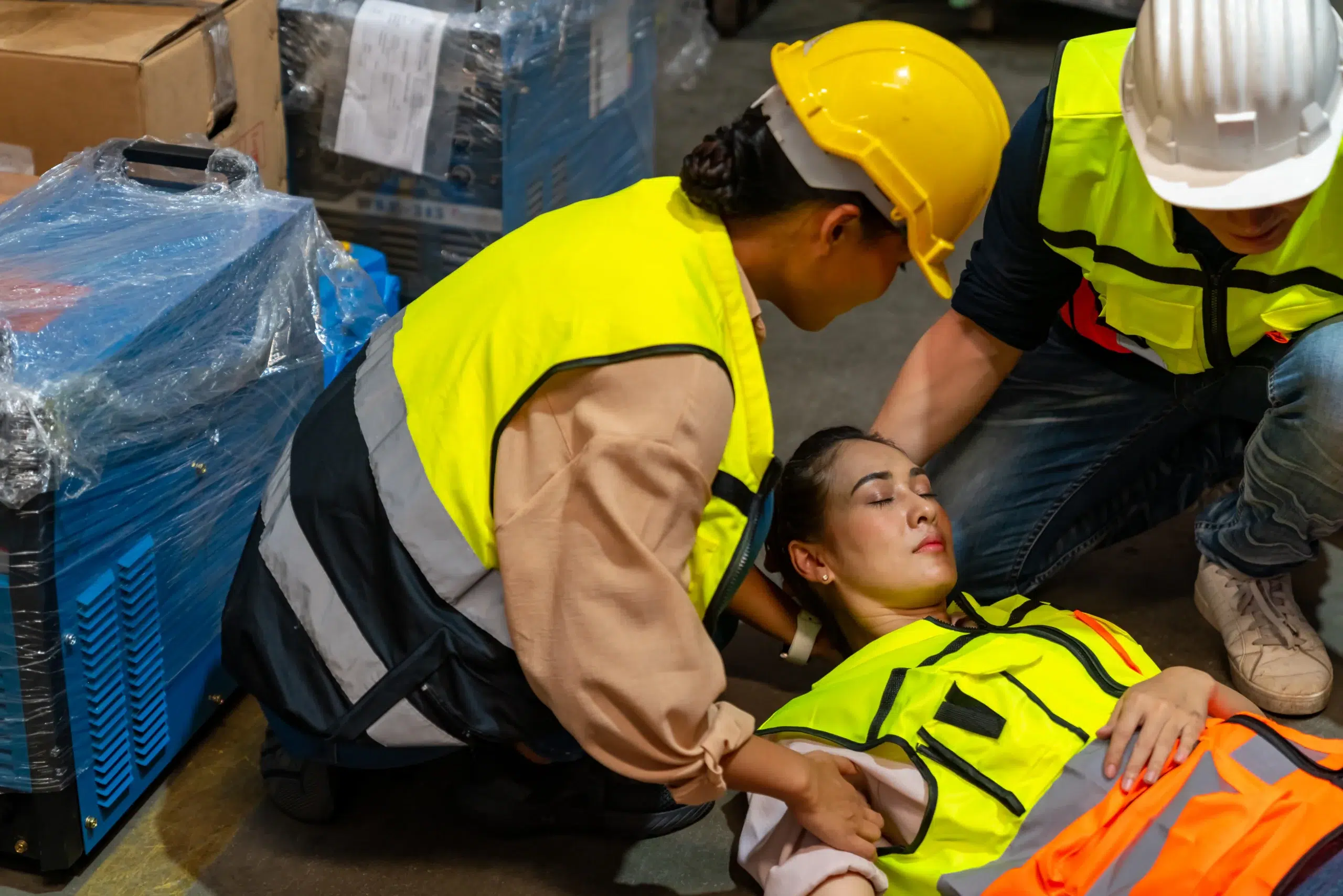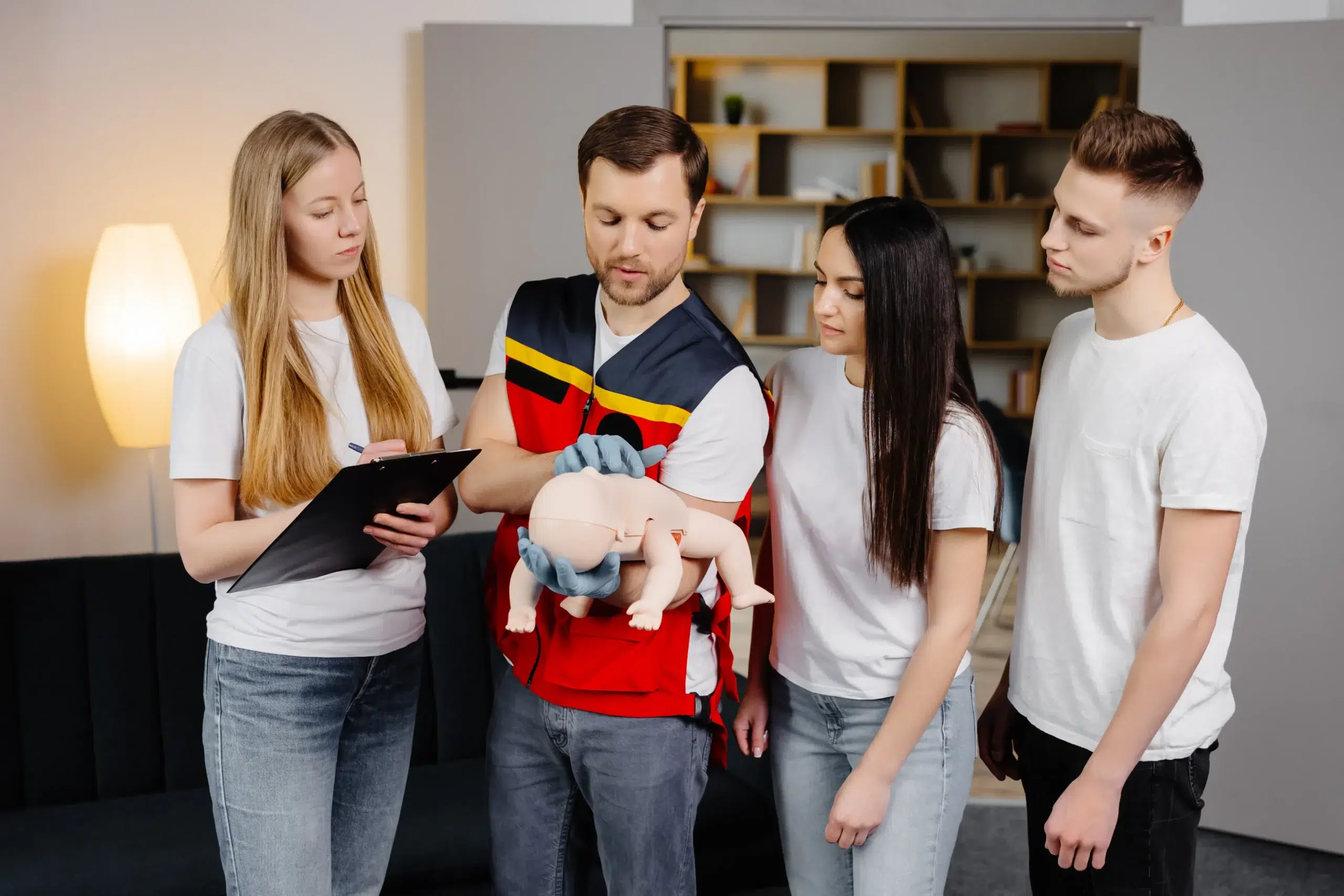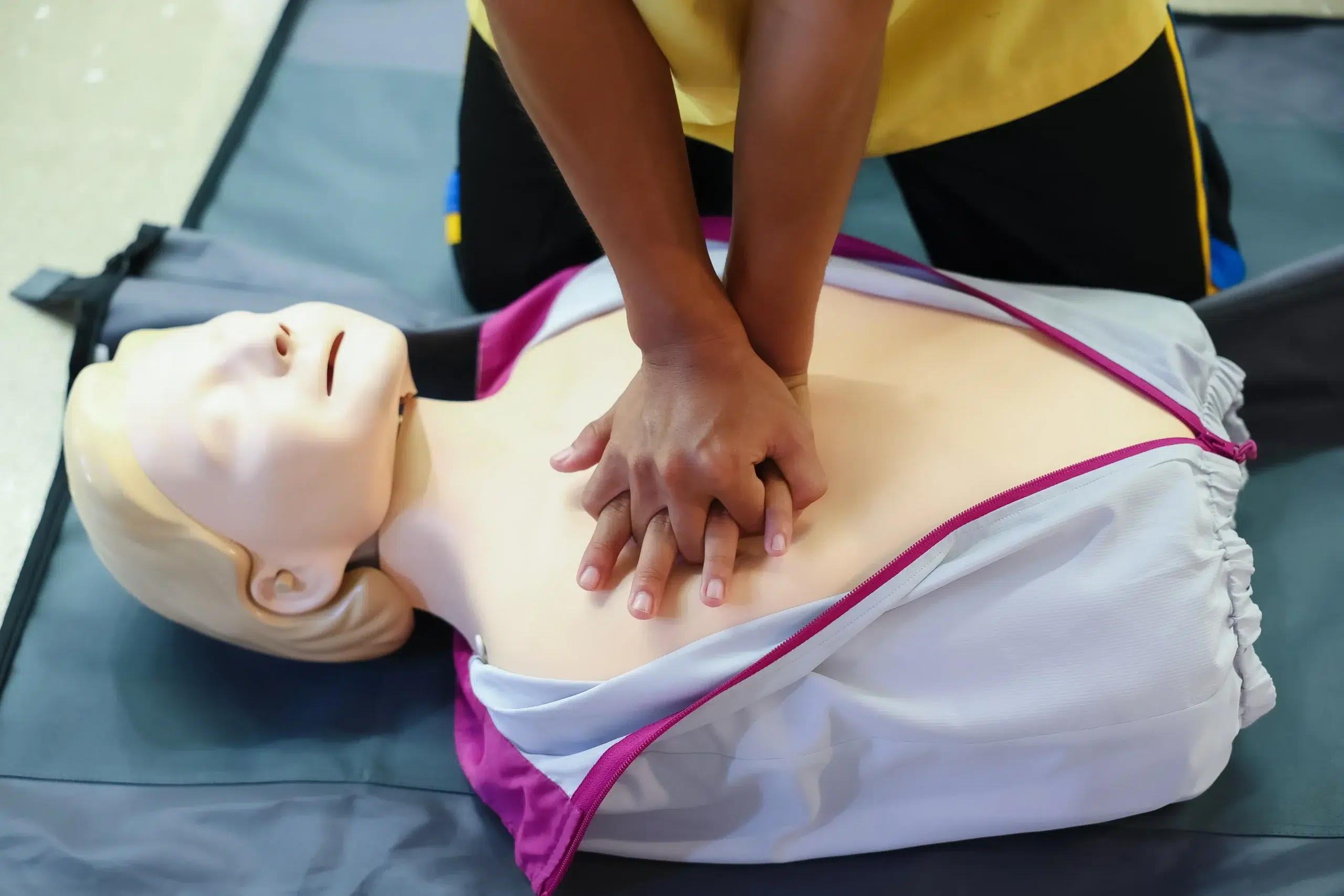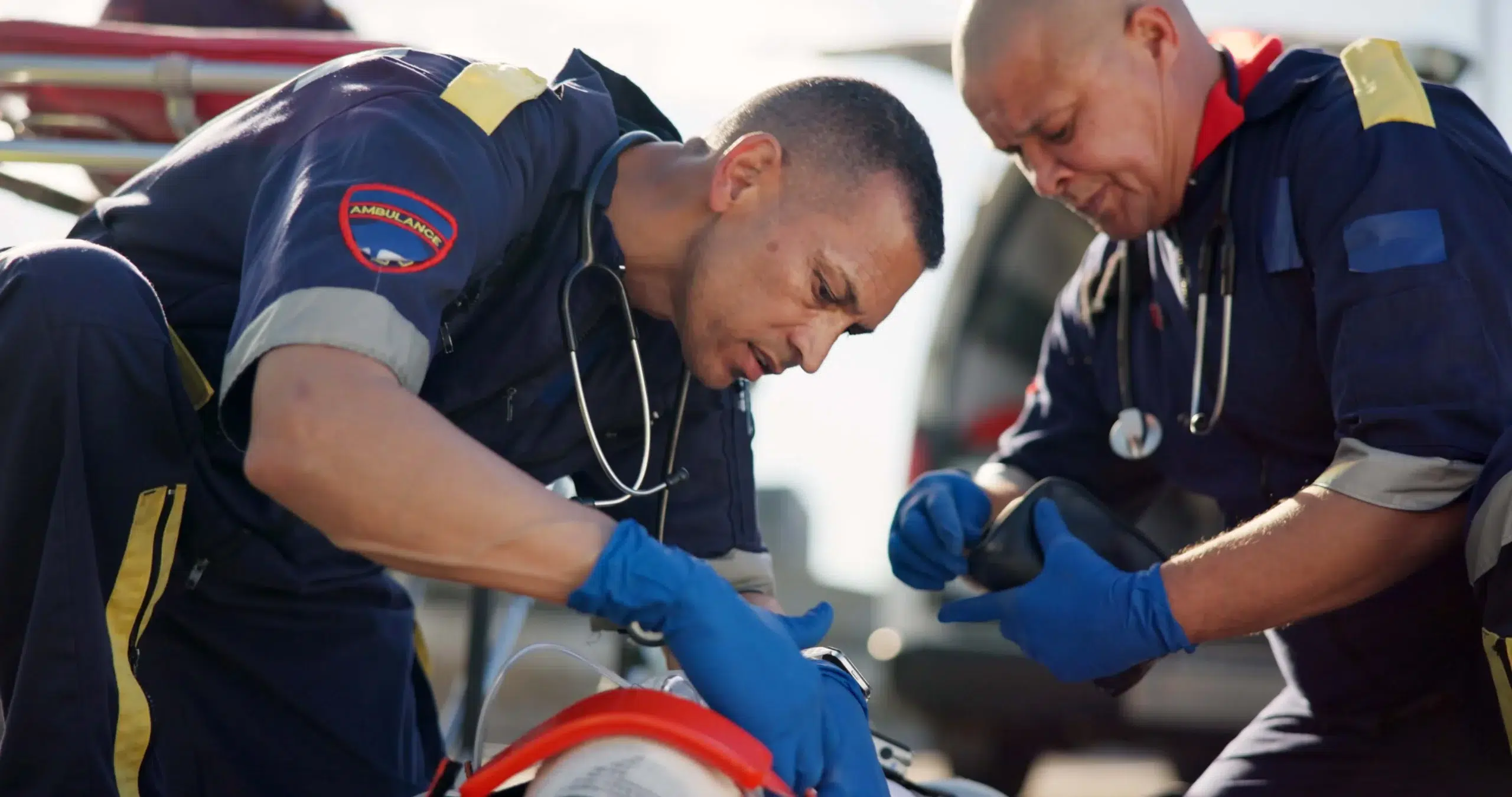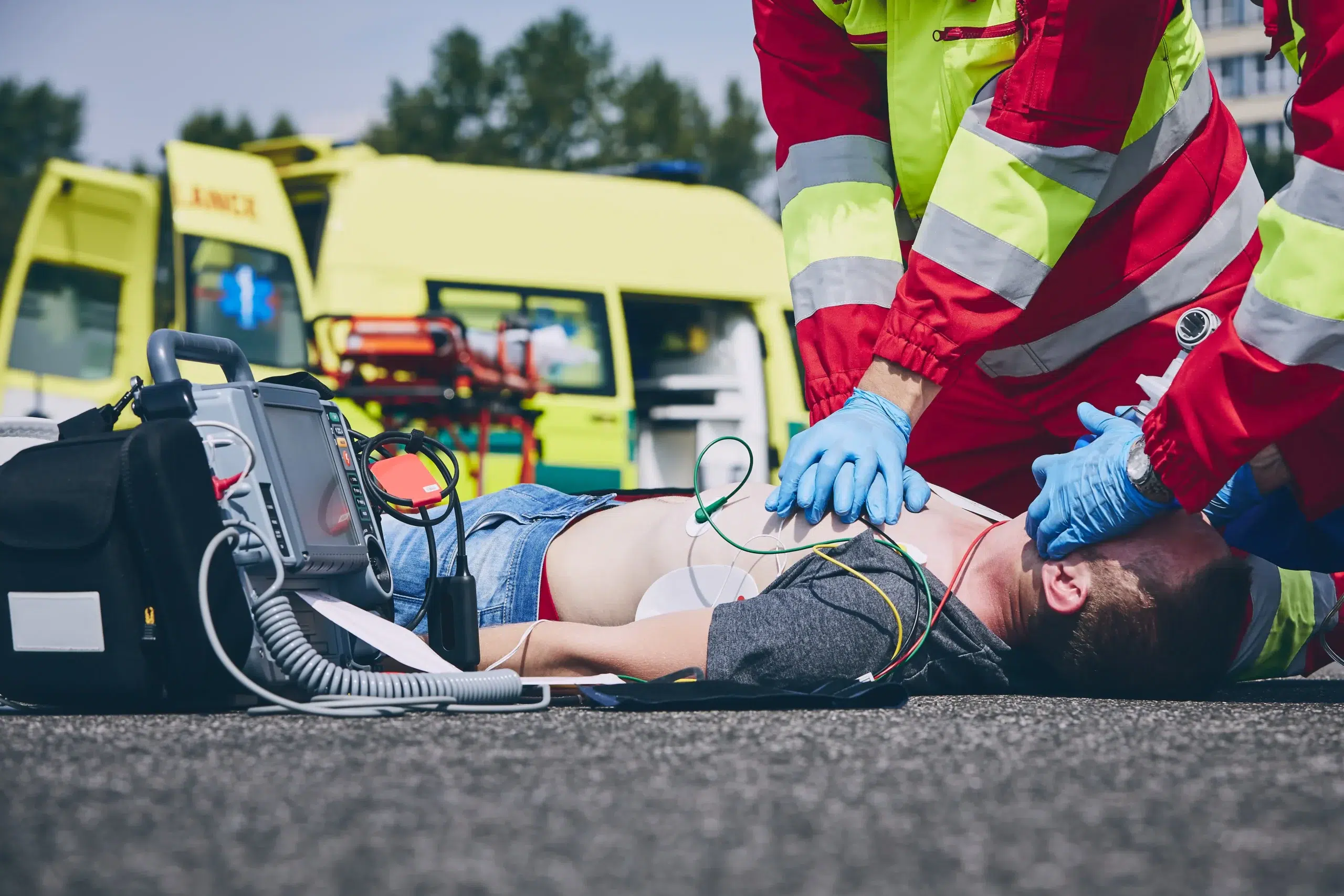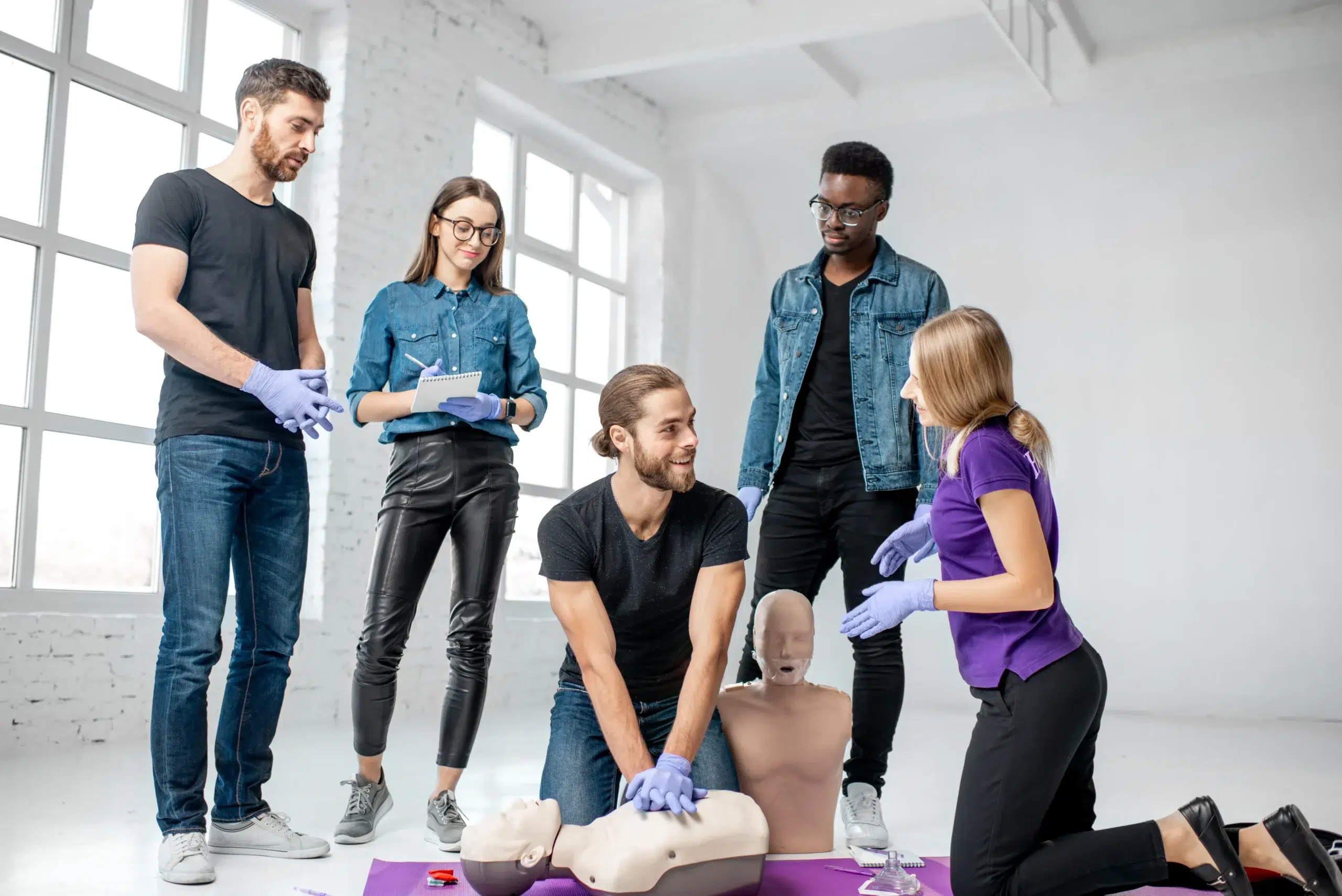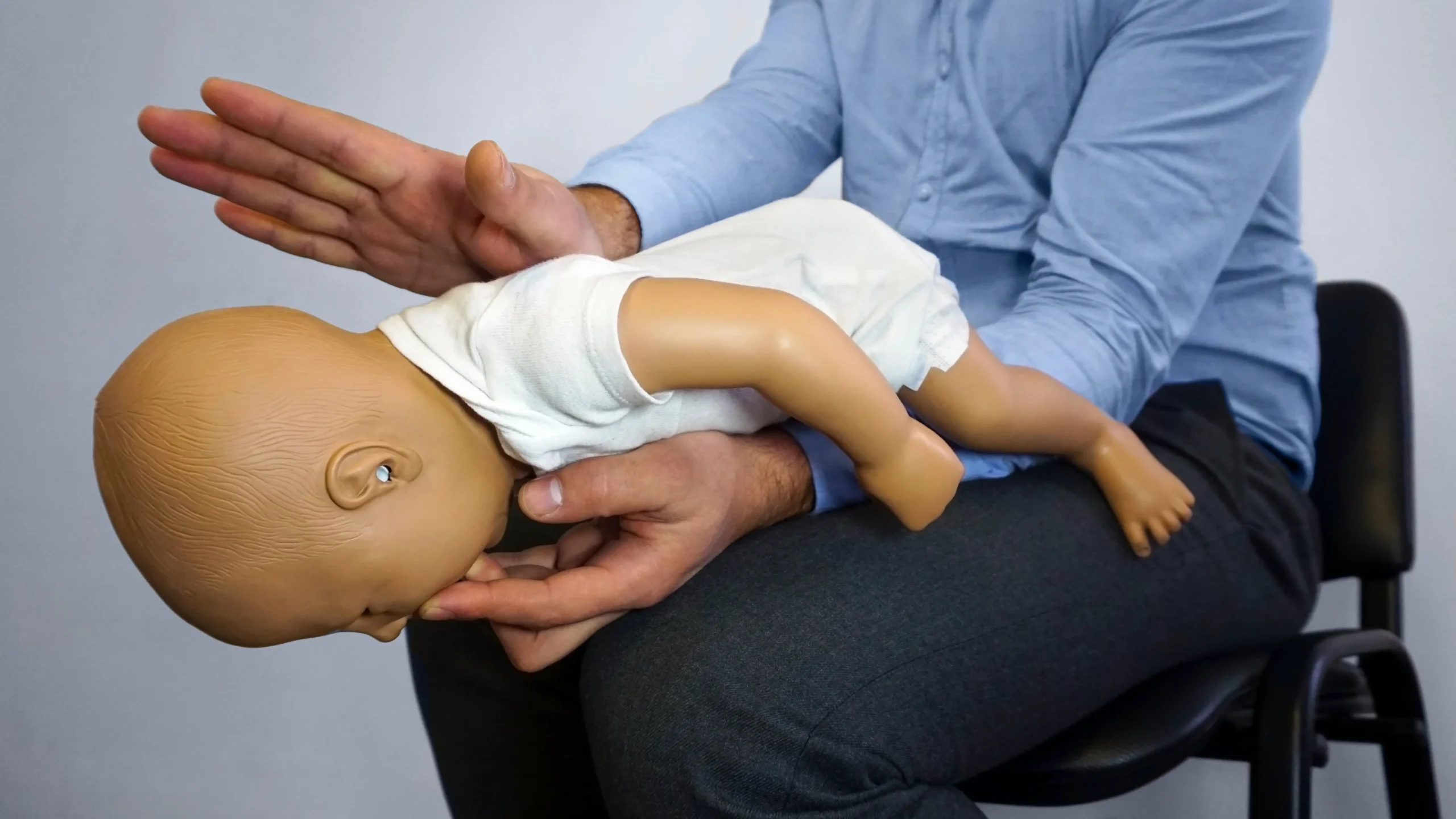Working in healthcare means being prepared for anything. From routine check-ups to unexpected emergencies, you need the skills and confidence to handle any situation. That’s where BLS for healthcare providers in Newark comes in. BLS certification equips you with the essential life-saving techniques needed to respond effectively to cardiac arrest and other critical situations. This article breaks down the key components of BLS training, including CPR, AED use, and airway management. We’ll also explore the benefits of hands-on training, discuss the latest AHA guidelines, and help you find the right BLS course in Newark to fit your busy schedule. Empower yourself to make a real difference in patient care with comprehensive BLS training.
Key Takeaways
- BLS is a must-have for healthcare providers: It’s a foundational skill set for various medical professionals, ensuring they can respond effectively to emergencies and improve patient outcomes. Consistent practice is key for staying sharp.
- BLS training is accessible and affordable: Newark offers various options, including Safety Training Seminars, with convenient schedules, a low price guarantee, and group discounts. Explore different learning formats to find what works best for you.
- Stay up-to-date with the latest guidelines: BLS best practices evolve. Ensure your training reflects current AHA guidelines for optimal patient care. Regular recertification keeps your skills and knowledge current.
What is BLS for Healthcare Providers?
What is BLS & Why is it Crucial?
Basic Life Support (BLS) is the bedrock of emergency medical care, focusing on the immediate treatment of life-threatening conditions, especially cardiac arrest. It’s designed for healthcare professionals like nurses, physicians, paramedics, and other emergency responders. The main goal of BLS is to keep a person alive until they can receive more advanced medical help. High-quality BLS dramatically improves a patient’s chances of survival, especially when performed quickly and correctly according to the American Heart Association’s evidence-based guidelines. These guidelines are regularly updated to reflect the latest research and best practices. Time is of the essence in these situations, and effective BLS can make all the difference.
Key BLS Skills & Techniques
BLS covers a range of essential skills and techniques. These include high-quality CPR (chest compressions and rescue breaths), using an AED (automated external defibrillator), and relieving airway obstructions. Learning how to quickly assess a patient, make critical decisions under pressure, and communicate clearly with colleagues are also vital parts of BLS training. BLS certification courses cover both single-rescuer and team-based scenarios, preparing professionals for diverse situations they might encounter in their work. This comprehensive approach ensures healthcare providers can confidently and effectively respond to various emergencies.
BLS Course Structure & Duration
Instructor-Led Sessions & Hands-On Practice
BLS courses for healthcare providers blend traditional classroom learning with hands-on skill development. You’ll learn through a combination of instructor-led discussions, demonstrations, and interactive exercises. A major component of the course involves practicing essential BLS skills like CPR, using an AED, and providing rescue breaths. This practical training, often using mannequins and other training equipment, ensures you can confidently perform these skills in a real-life emergency. Working closely with a certified BLS instructor gives you personalized feedback and guidance, helping you master these life-saving techniques. This interactive approach is far more effective than simply reading a textbook or watching a video, as it allows you to build muscle memory and develop the confidence to act quickly under pressure. Safety Training Seminars offers BLS courses with this hands-on training.
Time Commitment & Certification Validity
So, how much time do you need to set aside for your BLS certification? Instructor-led BLS courses typically require around four to five hours to complete. Some programs also offer blended learning, which combines online modules with shorter in-person skills sessions. These blended courses can sometimes shave an hour or so off the total time commitment. Once you successfully complete the course and skills testing, you’ll receive your BLS certification, typically valid for two years. This two-year validity aligns with the American Heart Association guidelines and ensures that healthcare professionals regularly refresh their skills and knowledge. Maintaining a current BLS certification is a requirement for many healthcare roles.
Where to Find BLS Courses in Newark
Finding the right BLS course can feel overwhelming, but several excellent options are available in Newark and the surrounding areas. Whether you’re a healthcare professional, a student, or someone looking to gain this life-saving skill, you’ll find a program that fits your needs.
Safety Training Seminars: Your Local AHA Training Center
Safety Training Seminars is a woman-owned, AHA Training Center in Newark, California, offering various certification courses, including BLS. As an authorized provider, their courses adhere to the latest American Heart Association guidelines, ensuring you receive up-to-date training. They offer a low price guarantee and convenient schedules with daily BLS classes, making it easier to fit training into your busy life. They also offer discounts for groups, a great option for workplaces or groups of friends. Safety Training Seminars also provides CPR and First Aid certification if you’re looking to expand your skillset. Their HeartCode BLS program blends online learning with hands-on practice, giving you the flexibility to learn at your own pace before demonstrating your skills in person.
Other Local Training Options
Beyond Safety Training Seminars, you can find other organizations offering BLS certification in the Newark area. The American Red Cross provides BLS courses designed for healthcare providers and public safety professionals. CPR Certification Plus also offers AHA BLS CPR classes in Newark. For those affiliated with Newark Beth Israel Medical Center, their CPR Training Center offers BLS Provider courses. Remember to check each organization’s website or contact them directly for the most current course schedules and pricing.
Get BLS Certified
Getting your BLS certification is straightforward. This section walks you through registration, fees, and what to expect during your BLS training.
Registration & Course Fees
BLS certification courses are offered through various organizations and training centers, including Safety Training Seminars, an AHA Training Center right here in Newark. We offer BLS courses designed to fit your schedule and budget. Check our website for details about our pricing and our low price guarantee. For groups, we offer discounted rates, making it more affordable to train your whole team.
What to Expect & How to Prepare
A BLS course covers essential life-saving skills for healthcare providers. You’ll learn single-rescuer and team-based CPR for adults, children, and infants. The curriculum follows the latest American Heart Association (AHA) guidelines. Expect a combination of interactive lectures, hands-on practice, and skills testing. To prepare, review the basic BLS algorithms and familiarize yourself with the steps for performing high-quality CPR. This will give you a solid foundation before the course begins. You can also explore our CPR and First-Aid resources for a preview of the topics covered.
BLS for Different Healthcare Roles
Tailored Training for Various Professions
BLS certification isn’t just for paramedics and firefighters; it’s a fundamental requirement for a broad spectrum of healthcare providers. While emergency responders certainly benefit from BLS training, it’s equally vital for nurses, physicians, dentists, and other healthcare professionals. Think of it as a common language, ensuring everyone can respond effectively during a medical crisis. This widespread training creates a safety net, ensuring consistent, high-quality care for patients regardless of the specific healthcare setting. Anyone who might find themselves needing to assist during a medical emergency should consider BLS certification. It empowers individuals to confidently step in and provide immediate support, potentially bridging the gap until professional help arrives. This makes BLS relevant not only for healthcare professionals but also for those in roles like childcare, coaching, or even personal training. At Safety Training Seminars, we offer BLS courses in Newark designed to meet the needs of diverse professionals.
Team Dynamics & Communication in Emergencies
BLS training goes beyond individual skills; it emphasizes the importance of effective teamwork and communication. High-quality CPR often involves multiple responders, and coordinated efforts are crucial. Clear communication ensures everyone understands their role and can perform their tasks efficiently, minimizing confusion and maximizing the chances of a positive outcome. This collaborative approach is essential because BLS often represents the first line of defense in life-threatening situations, particularly during cardiac arrest. The goal is to stabilize the patient and provide essential life support until they can receive more advanced medical care, often during transport to a hospital. This highlights why seamless communication and coordinated teamwork are so critical. Modern BLS training often incorporates simulation-based learning to reinforce these skills. Practicing real-life scenarios in a simulated environment helps build confidence and improves long-term retention, preparing healthcare providers to respond effectively under pressure. This focus on team dynamics and practical application ensures that BLS training translates into real-world preparedness. Our discount group classes at Safety Training Seminars provide an excellent opportunity to practice these essential team dynamics. We also offer a low price guarantee, making high-quality BLS training accessible to everyone.
Latest AHA Guidelines for BLS
Staying current with the latest guidelines is key to providing effective care. Here’s a rundown of recent updates from the American Heart Association (AHA) regarding Basic Life Support (BLS).
2020 AHA Guidelines Update
The 2020 AHA Guidelines Update for CPR and Emergency Cardiovascular Care (ECC) emphasizes high-quality CPR, integrating both single-rescuer and team-based approaches. These guidelines aim to improve the skills of healthcare providers in both prehospital and in-facility settings. The AHA BLS Provider course, taught by certified instructors like those at Safety Training Seminars, focuses on essential skills like chest compressions, ventilation techniques, and using an AED. These updates reflect the latest scientific evidence and best educational practices to improve patient outcomes during cardiac emergencies. For healthcare providers, staying current with these guidelines is crucial for delivering the most effective care. You can find more information about our BLS courses in Newark on our website.
Virtual Skills Assessment Requirements
As of September 1, 2023, the AHA implemented new guidelines for virtual skills assessments in BLS training. BLS Training Centers and instructors must adhere to specific protocols when conducting these virtual assessments. This includes using updated agendas and skills testing checklists to ensure participants demonstrate the necessary competencies in a virtual format. These changes aim to maintain the quality of BLS training while adapting to the changing educational landscape. If you’re considering a virtual BLS course, make sure the program adheres to these updated requirements. Contact us to learn more about the format of our courses and how they align with the latest AHA guidelines.
Maintain Your BLS Certification
Keeping your BLS certification current is essential for any healthcare provider. It’s not just a box to check; it’s a commitment to providing the highest quality of care. This section covers everything you need to know about renewing your BLS certification and staying up-to-date with the latest guidelines.
Renewal Process & Requirements
BLS certification is typically valid for two years. Before your certification expires, you’ll need to complete a recertification course. This ensures you’re always practicing with the most current knowledge and techniques. Planning ahead and scheduling your recertification in advance is key to avoiding any lapse in your credentials. Check with your employer or certifying organization for specific renewal requirements. At Safety Training Seminars, we offer convenient BLS renewal courses in Newark to help you maintain your certification seamlessly.
Stay Current with BLS Guidelines
The field of healthcare is constantly evolving, and BLS guidelines are updated periodically to reflect the latest scientific evidence and best practices. Staying informed about these updates is crucial for providing effective and safe patient care. The American Heart Association (AHA) regularly publishes updated guidelines, and it’s your responsibility as a healthcare provider to familiarize yourself with them. Our courses at Safety Training Seminars always adhere to the latest AHA guidelines, ensuring you receive the most relevant training. We cover key updates and changes, giving you the confidence to apply the latest techniques in real-world scenarios. For more detailed information on guideline updates, resources like this overview of the 2024 AHA BLS Guidelines can be helpful.
Common BLS Misconceptions
Debunking Myths & Clarifying Facts
It’s easy to misunderstand BLS, especially if you haven’t taken a course before. Let’s clear up some common misconceptions. First, BLS training isn’t just for doctors and nurses. Anyone can learn these lifesaving skills—teachers, coaches, parents, grandparents—anyone. In fact, having more people in a community trained in BLS can significantly improve outcomes during emergencies. Second, while online resources can be helpful supplements, obtaining your BLS certification requires an accredited, hands-on course like those offered at our Newark training center. This ensures you receive high-quality instruction and demonstrate competency in essential skills. Finally, BLS training isn’t a one-and-done deal. Regular recertification is crucial for staying up-to-date with the latest American Heart Association guidelines and maintaining your skills. It’s the best way to ensure you’re prepared to respond effectively in a real-life emergency. We offer a variety of courses, including BLS for Healthcare Providers, to fit your specific needs.
The Importance of Continuous Learning
Think of BLS training like any other important skill—regular practice makes all the difference. Studies show that ongoing training not only enhances your effectiveness in performing BLS but also boosts your confidence and preparedness. Refresher courses reinforce proper techniques and introduce any updated guidelines, ensuring you’re always ready to provide the best possible care. Plus, continuous learning in BLS has a positive ripple effect. It contributes to a culture of safety and preparedness, benefiting both individuals and the wider community. At Safety Training Seminars, we offer group discounts to make ongoing training more accessible. We believe that everyone should have the opportunity to learn and maintain these vital skills.
Overcome BLS Certification Challenges
Getting your BLS certification is essential for many healthcare roles, but we understand that life can get in the way. Between demanding schedules, family commitments, and other obligations, finding the time for training can feel overwhelming. This section addresses common challenges and offers practical solutions to help you succeed.
Address Time Constraints & Accessibility Issues
Many healthcare providers struggle to fit BLS training into their busy schedules. Fortunately, there are options available to make the process more manageable. Blended learning formats, like those offered by the American Red Cross, combine online coursework with in-person skills sessions. This allows you to complete the theoretical portion at your own pace, fitting it around your other commitments. Remember, BLS training equips you with the skills to respond to breathing and cardiac emergencies, making it a worthwhile investment in your professional development. If you’re in the Newark, CA area, Safety Training Seminars offers daily BLS certification courses to accommodate various schedules. We also understand that cost can be a barrier, which is why we offer a low price guarantee.
Resources for Successful Completion
Preparing for your BLS certification is key to a smooth and successful experience. Reviewing resources, such as those available through Vitali, can help you understand the core concepts and skills required for healthcare providers. This preparation can boost your confidence and make the learning process more efficient. If you’re already certified and looking to refresh your skills, consider convenient recertification courses. At Safety Training Seminars, we ensure our courses align with the latest AHA guidelines, providing you with the most current and relevant training available. We also offer discounted group classes for those training with colleagues or friends. Don’t hesitate to reach out to our team—we’re here to support you.
BLS Impact on Patient Outcomes
Basic Life Support (BLS) skills are essential for healthcare providers. Studies show that effective BLS can significantly improve patient outcomes, especially in life-threatening situations like sudden cardiac arrest (SCA). Applying these skills correctly can decrease both mortality and morbidity rates following SCA, a leading cause of death. Beyond the immediate impact on patient survival, BLS training also positively affects healthcare providers’ confidence and makes them more effective in critical situations. Regular BLS training is recommended throughout a healthcare professional’s career to reinforce these skills and ensure they are applied effectively during clinical training and real-life emergencies. This ongoing training helps build confidence and ensures providers can react swiftly and efficiently when facing critical situations. Improving patient outcomes through BLS relies on consistent training and adherence to the latest guidelines.
Real-World BLS Applications
BLS skills have practical, real-world applications that directly translate to better patient care. Hands-on training, particularly through realistic simulations, is crucial for developing and retaining these essential skills. Simulation-based learning, especially high-fidelity simulations, helps healthcare providers practice their skills in a safe environment, improving long-term retention and their ability to respond effectively under pressure. Focusing on team dynamics and real-life scenarios during these simulations further enhances the effectiveness of BLS application. By working together in simulated emergencies, healthcare teams can refine their communication and coordination, leading to smoother and more effective responses in actual emergencies. This practical approach to BLS training ensures that healthcare providers are well-prepared to handle the challenges they face daily. Regular practice and realistic training scenarios are key to mastering BLS for real-world application.
Enhance Patient Care & Safety in Newark
High-quality BLS is a cornerstone of effective patient care, particularly in emergencies. When performed according to established guidelines, BLS can significantly improve patient outcomes. In Newark, healthcare providers equipped with up-to-date BLS certification play a vital role in ensuring patient safety. They are prepared to respond quickly and effectively to emergencies, providing immediate care that can stabilize patients and improve their chances of survival. Safety Training Seminars offers comprehensive BLS courses in Newark designed to equip healthcare professionals with the skills and knowledge they need to provide exceptional patient care. These courses cover the latest AHA guidelines and emphasize hands-on practice to ensure participants can confidently apply their skills in real-world situations. By investing in BLS training, healthcare providers in Newark can contribute to a safer and healthier community for everyone. Prioritizing BLS training is an investment in patient well-being and the overall health of the Newark community.
Related Articles
- BLS Courses in Fremont: Your Complete Guide – Newark CPR Classes
- BLS Courses in San Jose: The Complete Guide – Newark CPR Classes
- HeartCode BLS Fremont: Your Certification Guide – Newark CPR Classes
- BLS Courses in Newark: Your Complete Guide – Newark CPR Classes
- BLS Classes in Newark: Your Guide – Newark CPR Classes
Frequently Asked Questions
How often do I need to renew my BLS certification? BLS certification is typically valid for two years. You’ll need to take a recertification course before it expires to stay current with the latest guidelines.
What’s the difference between BLS for healthcare providers and regular CPR training? BLS for healthcare providers is more comprehensive than standard CPR training. It covers advanced techniques, team dynamics, and the use of an AED, preparing healthcare professionals for a wider range of emergency situations. It also follows specific American Heart Association guidelines.
Are online-only BLS courses acceptable for healthcare professionals? While online resources can be helpful for reviewing material, a hands-on skills assessment with a certified instructor is required for BLS certification for healthcare providers. You need that in-person training to demonstrate your competency.
I’m nervous about the skills testing. What if I don’t pass? Certified instructors understand that learning these skills can be challenging. They provide supportive guidance and feedback throughout the course. You’ll have opportunities to practice and improve your technique before the final skills test. If you don’t pass initially, most training centers offer additional practice and retesting options.
Why should I choose Safety Training Seminars for my BLS training? Safety Training Seminars is a woman-owned, authorized AHA Training Center in Newark, California. We offer high-quality BLS courses that adhere to the latest AHA guidelines. Our convenient schedules, low price guarantee, and group discounts make it easier for individuals and teams to access this essential training. We’re committed to providing a supportive learning environment where you can confidently develop your life-saving skills.
